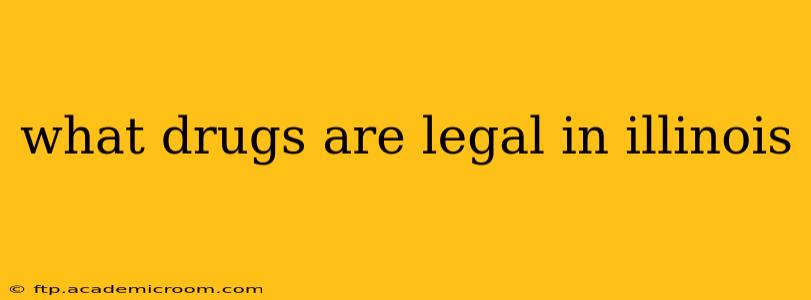Illinois has taken a progressive approach to drug policy, legalizing certain substances while maintaining strict regulations on others. Understanding the legal landscape surrounding drugs in the state is crucial, both for residents and visitors. This guide will clarify which drugs are legal in Illinois and highlight the important distinctions between legal and illegal substances.
It's crucial to remember that even legal substances can have serious consequences if misused. This information is for educational purposes only and should not be considered legal advice. Always consult with legal professionals or relevant authorities for definitive answers.
What Drugs Are Legally Available in Illinois?
Several substances are legally available in Illinois under specific circumstances and with appropriate regulations:
-
Prescription Medications: Many medications, including pain relievers, anxiety medication, and antidepressants, are legal only with a valid prescription from a licensed physician. Possession or use without a prescription is illegal and carries serious penalties.
-
Over-the-Counter (OTC) Medications: A wide range of medications are available for purchase without a prescription at pharmacies and other retail locations. These include pain relievers like ibuprofen and acetaminophen, allergy medications, and cold remedies. While legal, it's important to follow the recommended dosage and consult a healthcare professional if you have concerns.
-
Alcohol: The legal drinking age in Illinois is 21. The sale and consumption of alcoholic beverages are regulated, with restrictions on public consumption and purchasing by minors.
-
Tobacco Products (with restrictions): While legal, the sale and use of tobacco products are subject to significant restrictions, including age limits, taxation, and advertising regulations. The sale of vaping products containing nicotine is also regulated. This includes age limits and restrictions on the type and amount of nicotine.
-
Cannabis (Marijuana): Illinois legalized recreational cannabis in 2019. Adults 21 and older can legally purchase and possess up to 1 ounce of cannabis. There are also limits on the amount of cannabis concentrates and edibles that can be legally possessed. However, public consumption remains illegal.
What About Other Substances? Are They Legal in Illinois?
Many substances remain illegal in Illinois, regardless of medical or recreational use. These include:
- Cocaine: Possession, use, and distribution of cocaine are serious felonies with harsh penalties.
- Heroin: Similar to cocaine, heroin is a highly controlled substance with severe legal consequences for possession, use, or distribution.
- Methamphetamine: A highly addictive stimulant, methamphetamine is illegal in Illinois, and possession or distribution carries significant penalties.
- LSD: This hallucinogenic drug is illegal in all forms.
- Other Illegal Drugs: Numerous other drugs, including various opioids, hallucinogens, and stimulants, remain illegal under Illinois law.
What are the Penalties for Illegal Drug Possession in Illinois?
The penalties for illegal drug possession in Illinois vary greatly depending on the specific drug, the amount possessed, and the individual's prior criminal record. Penalties can range from fines and probation to lengthy prison sentences.
Are There Any Medical Marijuana Programs in Illinois?
Yes, Illinois has a comprehensive medical cannabis program. Patients with qualifying medical conditions can obtain a medical cannabis card, allowing them to legally purchase and use cannabis for therapeutic purposes. The program has specific requirements and guidelines that patients must meet.
What are the Restrictions on Recreational Cannabis Use in Illinois?
While recreational cannabis is legal, there are several restrictions:
- Age Limit: You must be 21 or older to purchase or possess cannabis.
- Public Consumption: Public consumption of cannabis is prohibited.
- Driving Under the Influence (DUI): Driving under the influence of cannabis is illegal and carries severe penalties.
- Workplace Restrictions: Employers generally retain the right to prohibit cannabis use by employees, even if legal for recreational use.
This guide provides a general overview of drug legality in Illinois. The legal landscape is complex and subject to change. For the most accurate and up-to-date information, consult official Illinois state government resources and legal professionals. Always prioritize safety and responsible use of any substance, legal or otherwise.
